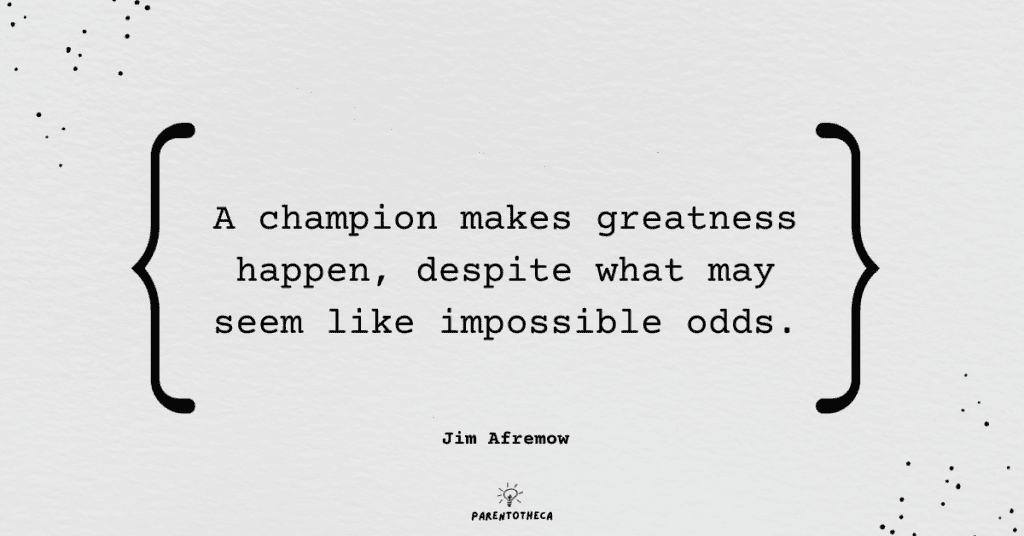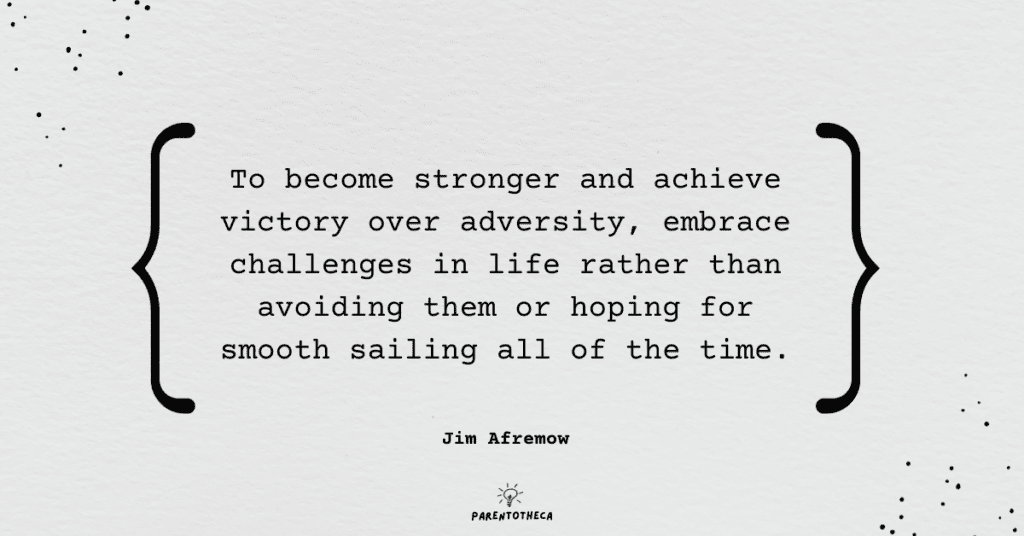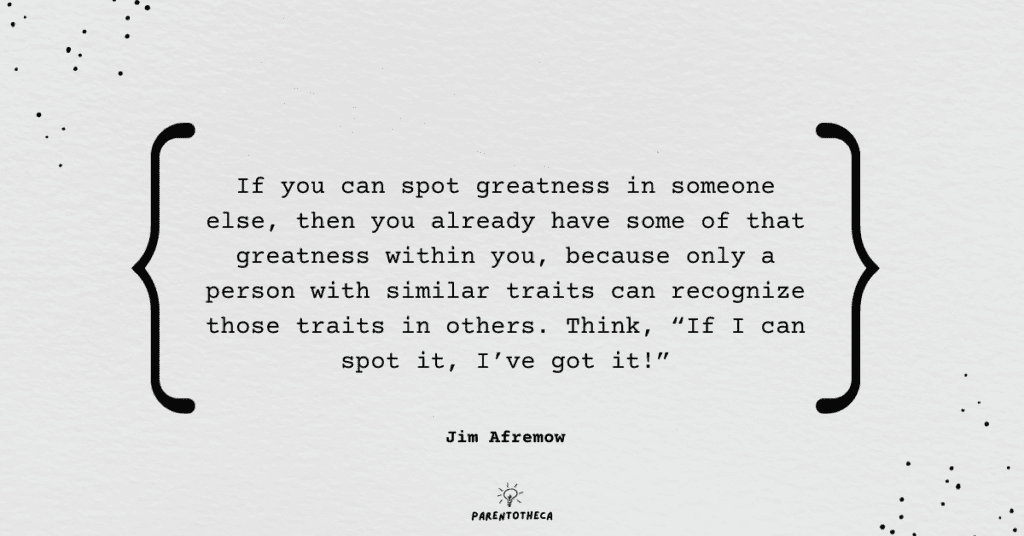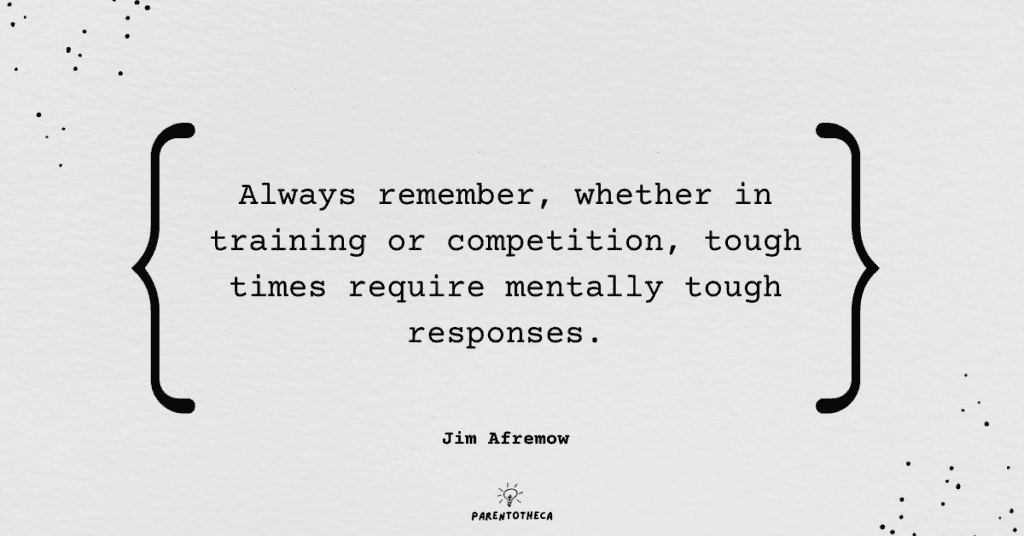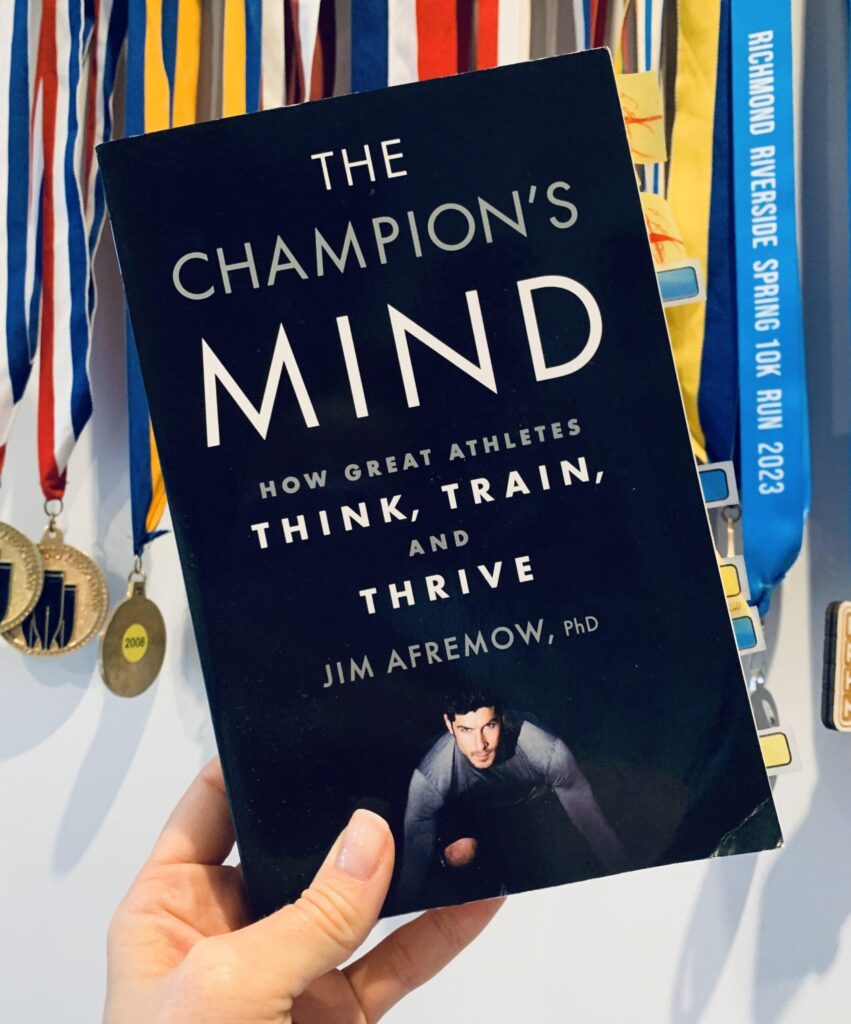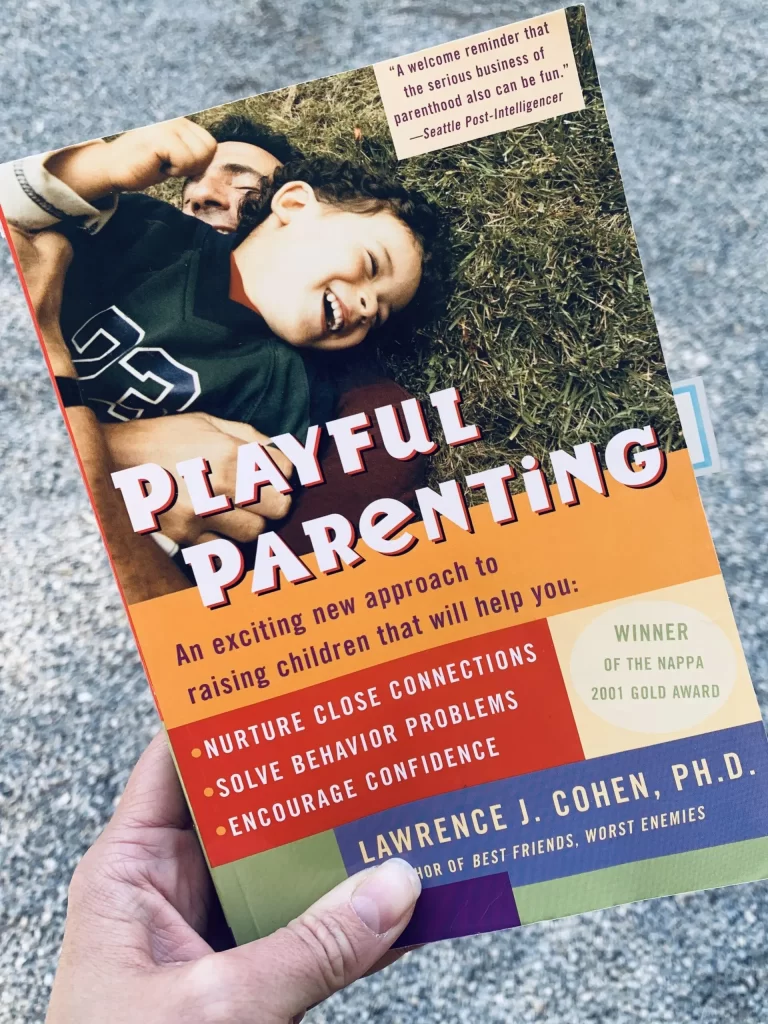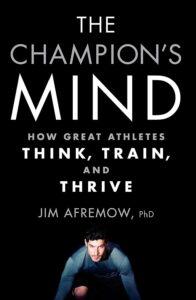 The Champion’s Mind
The Champion’s Mind
How Great Athletes Think, Train, and Thrive
Jim Afremow
Rodale Books; Reprint edition (15 May 2015)
About the Author:
Dr. Jim Afremow is a high-performance consultant and the author of several best-selling books on sport psychology and leadership. He provides mental skills training and leadership services to athletes, teams, and coaches at all levels of sport, as well as to corporate “athletes” and professionals across all achievement domains.
For over 20 years, Dr. Afremow has assisted numerous high school, collegiate, recreational, and professional athletes. Major sports represented include MLB, NBA, WNBA, PGA Tour, LPGA Tour, NHL, and NFL. In addition, he has mentally trained several U.S. and international Olympic competitors. He served as the staff mental coach for two international Olympic teams, the Greek Olympic softball team and India’s Olympic field hockey team. From 2004 to 2013, he served as a senior staff member with Counseling Services and Sports Medicine at Arizona State University.
About the Book:
“What separates the top few from the many in a sport? Mentality. The importance of the mental side of athletics was once brilliantly summed up by basketball legend Kareem Abdul-Jabbar: “Your mind is what makes everything else work.” Tennis great Novak Djokovic further explains: “[Among the] top 100 players, physically there is not much difference… It’s a mental ability to handle the pressure, to play well at the right moments.” […]
Champion yourself. We all experience similar struggles and deal with demanding challenges in our pursuit of excellence, regardless of the sport or fitness activity. To be a champion, your true best self becomes key to personal and athletic greatness. You know, as we all do, that only those performers who think gold and never settle for silver will continue to strive for and reach their highest, or gold, level. A champion makes greatness happen, despite what may seem impossible odds.
Of course most of us are not Olympians or professional athletes. But all of us can acquire a champion’s mind-set. Any athlete can learn to think like a champion. Every one of us can be peak performers in the game of life by achieving our own personal best. We can strive to be the best version of ourselves. It is possible for us to stay ‘professional’ whenever adversity strikes. It is possible to ingrain mental fortitude that drives us forward. And it is possible to take a championship approach.”
Meet Jim Afremow, a top-tier sports psychologist working with some of the best athletes out there.
And his book The Champion’s Mind is a gem! Packed with bite-sized wisdom, it’s like a guide to unlocking your inner champion. From goal setting to visualization, self-talk, breath control, confidence, and mental toughness, Afremow covers it all.
The book’s main message is clear: with the right mindset, we all have the potential to become champions in sports and in life. And honestly, I couldn’t agree more! My highlighter ran dry before I even finished the book – that’s how good it is.
I personally dived into The Champion’s Mind as part of my prep for a half marathon, and I have to admit, it seriously levelled up my game.
To sum it up, this is a must-read for anyone committed to becoming a better athlete and a better human being. The book is packed with wisdom, and I can’t wait to share my favourite ideas with you.
Let’s jump straight in.
P.S.: Every sentence in this book had me nodding along, feeling like I was chatting with my husband Dawid, a former professional rower and my true inspiration.
Key Insights:
Master the Mental Skills
“The science-based mental skills presented in this chapter are proven winners for helping athletes forge a champion’s mind-set in order to grasp their full capability. You will recognize some of the skills; your challenge will be then to master them. You will learn several powerful new skills that you can apply with ease to your game play. Adapt each mental skill to fit your particular needs and situation.
A mind-over-mater approach doesn’t develop overnight. Follow the same learning process used to develop your physical skills: repetition (deliberate and daily mental practice) and reinforcement (feeling good about your efforts by saying things like “I’m gaining mental muscle.”). To build mastery, stick to the improvement plan and try to focus on one or two mental skills multiple times each day to build a strong and fortified foundation. The mental skills are:
• GOAL SETTING: Think It, Then Ink It
• MENTAL IMAGERY: Visualize to Actualize
• SELF-TALK: Feed the Good Wolf
• CONFIDENCE: Flex Your Confidence Muscle
• FOCUS: A Champion is a Now-ist
• BREATH CONTROL: Breath Life into Your Performance
• MENTAL TOUGHNESS: Build Your Inner-Strength Bank Account
• ANXIETY MANAGEMENT: Go from Panicky to Pumped
• ENJOYMENT: Humor Is the Best Sports Medicine
• BODY LANGUAGE: Make a golden Impression
• INTENSITY: Own Your Zone
• PERSONAL AFFIRMATION WORKS: Power Phrases for Becoming a Champion”
In chapter 2, Dr Afremow walks us through the mental skills every champion needs to master.
Why? Being a top-tier athlete isn’t just about flexing your muscles; it’s about flexing that mental game, too.
These 12 mental skills are like the secret recipe that turns a good athlete into a total legend. And guess what? They’re all backed by science and proven in the field.
Now. All these skills are the keys to winning in the game of life!
Towards the end of the book, Jim suggests using this list as a mental game scorecard to build your own mental game plan. Want more details? Check out the book for more.
But for now, here’s a question: which mental skills on the list could use some work to up your game? Pick your top three and get cracking on them today.
Let’s quickly go through a couple of these mental skills in more detail.
Flex Your Confidence Muscle
“Sports psychology studies and anecdotal reports from winning athletes confirm that confidence is crucial for athletic success. Specifically, self-confidence is a strong belief in one’s skills, preparation, and abilities. Confidence in tough situations is the mark of a great player, according to legendary tennis player John McEnroe. In order to be successful, you must believe that you can be successful. […]
Complacency is often the culprit when an athlete or team blows a big lead or loses to an “inferior” opponent (who obviously did not see themselves as inferior). Extremely high confidence is never the problem, provided that you are continuously working hard and intelligently in training to become the best athlete you can be and you have an undying will to win during competition: You can hate to lose, but don’t be afraid to lose. Confidence without complacency keeps you on target when you are playing well and winning.”
If you want to win, you have to believe that you can win. Enter growth mindset.
Now. How do you grow your confidence muscle? Through proper preparation. Practice is everything. Confidence is based on competence. Afremow highlights that if we want to gain competence for competition, we also need demonstrated performance so we can reflect on previous successes and savour our wins.
To help us out, Afremow throws in seven questions for self-reflection in the book, inspired by the work of Stanford psychologist Dr. Albert Bandura. Want more? Check out the book for the full scoop.
He also shares this powerful advice:
“Rather than trying to perform without fear, strive to perform with confidence. Affirmative self-talk needs to take the shape of phrases like “I can do this!” rather than “Don’t blow it!”, “Stay on target!” instead of “Block out distractions”; or “Hang tough!” in lieu of “Don’t quit now.”
That’s the power of self-talk!
P.S.: Speaking of developing mastery, take a peek at our notes on Anders Ericsson’s great book Peak, where he explains how all of us can achieve extraordinary things through deliberate practice.
Mental Toughness
“Mental toughness does not entail clenching your teeth, trying harder, thinking more, straining your eyes to focus, or having someone scream ‘Be tough!’ at you. Mental toughness is the ability to remain positive and proactive in the most adverse of circumstances.
Mental toughness is built on doing the thing that is hard over and over again, especially when you don’t feel like it. Push through on your down days when you are not feeling your best. Distraction, discomfort, and difficulties are no match for the champion.”
Mental toughness is one of the most important mental skills not only in sports but also in life. And I love how Afremow defines mental toughness – just WOW.
When I was digging into this chapter, it reminded me of this Nike ad with Matt Scott (seriously, every time I watch it, goosebumps):
No excuses philosophy. That’s one of the key ingredients for grit.
Now, a question for you – how’s your mental toughness game? What’s one thing you can kick into gear today to level it up?
Be Your Own Toughest Rival
“A central for becoming a champion is to battle against your best or gold self. Do not accept a silver or bronze attitude and effort level. Pro Football Hall of Fame quarterback Steve Young said, “The principle is competing against yourself. It’s about self-improvement, about being better than you were the day before.” In other words, always try to win against your own standard of excellence and keep raising the bar on your own level of play.”
That’s from the wisdom-packed chapter “The Wisdom of a Champion.”
Afremow tells us that the champions show up in sports with a mastery approach: “they generally appreciate everything about the process of striving for personal excellence, regardless of the end result.”
Again, enter growth mindset here.
So, here’s the big idea: every day, go head-to-head with your best self. Strive to top yesterday’s you. Push yourself, challenge yourself – that’s the secret sauce. James Clear says it best in Atomic Habits:
“…if you can get 1 percent better each day for one year, you’ll end up thirty-seven times better by the time you’re done.”
Your Champion Journal
“How can you objectively evaluate your progress and build on your success? As a mechanism for sparking creativity and generating new ideas for improving your performance, debrief your game play on a regular basis. Evaluate the mental, technical, and tactical aspects. Specifically, ask yourself three questions: 1) What did I do that was good? 2) What needs to get better? 3) What changes should I make to become my best? This process will allow you to think broadly about each area of your game and then drill down to the details. Make this your Champion Journal.”
Self-reflection is our superpower.
Instead of diving headfirst into mistakes, failures and what we didn’t like about our performance, Afremow invites us to use the power of positive reinforcement and start with the “what went well” debrief. And I absolutely love this “Good. Better. Best” approach:
1) “What did you do that was good?”
Celebrate those wins, big or small.
2) “What needs to get better?”
Evaluate your weaknesses.
3) “What changes should I make to become my best?”
And that’s your step by step game plan for becoming a legend.
Good. Better. Best.
These prompts aren’t just for writing; they’re your guide to becoming a champion. So, grab that journal and get ready to level up!
Be a Champion Sports Parent
“Draw a circle on a piece of paper. This is your child’s Circle of Trust. A dot inside the circle represents a behavior helpful to your child. A dot outside the circle represents a behavior not helpful to your child. To be a champion sports parent, work with your child to identify whether your behaviors, with regards to his or her sports participation, land inside or outside the circle. Creating a visual representation such as this can be very beneficial during brainstorming efforts and help you make positive and practical changes, as well as bond with your child.”
That’s a great reminder to all sports parents.
Praising your kid’s attitude and effort? That’s a big dot inside the circle. Technical and tactical instructions? Yeah, that’s probably outside. You got the point.
Here is more parental wisdom from Afremow:
“Love your child for who he or she is, not for the things he or she can do. Help your child have experiences in which he or she accomplishes something to feel proud about. Correct your child’s misbehavior consistently and with compassion. Always give praise when it’s earned. Make good eye contact with your child and give him or her your full attention when he or she is talking to show you are really listening. You are a role model, so set an example of what you value in yourself. Follow these behaviors and you will stay in your child’s Circle of Trust.”
Now it’s your turn: what’s your game plan today to stay in your child’s Circle of Trust? Pick three actions and go for it!
The Monk and the Mirror – Zen in the Zone
“There was once a monk who would carry a mirror wherever he went. A priest noticed this one day and thought to himself, “This monk must be so preoccupied with the way he looks that he has to carry that mirror all the time. He should not worry about the way he looks on the outside. It’s what’s inside that counts.” So the priest went up to the monk and asked, “Why do you always carry that mirror?” thinking for sure this would prove his guilt. The monk pulled the mirror from his bag and pointed it at the priest. Then he said, “I use it in times of trouble. I look into it and it shows me the source of my problems as well as the solution to my problems.
Sports lesson: Take personal responsibility for all areas of your preparation and performance. You are responsible for maintaining a great attitude, expending your best effort during practice and in competition, and showing strong character off the field. Our background and circumstances may have influenced who we are, but we are accountable for who we become.”
This story is a gem. One of the most important things in life is to take full responsibility for our actions.
Here is a mantra from Nathaniel Branden’s great book The Six Pillars of Self-Esteem to repeat every day:
“I am responsible for my choices and actions. To be ‘responsible’ in this context means responsible not as the recipient of moral blame or guilt, but responsible as the chief causal agent in my life and behavior.”
Question for you – do you own up to your wins and losses, giving it a solid 100%?
Action Steps For You:
- Practice Mental Skills: Dedicate time to practice and master the mental skills outlined in the book, such as goal-setting, visualization, self-talk, confidence-building, and managing anxiety. Integrate these skills into your routine to enhance performance not just in sports but in various aspects of life.
- Reflect and Debrief: After every game, competition, or training session, engage in reflective practices. Use Afremow’s suggestions, like creating a “Champion Journal” or asking specific questions to evaluate your performance. Celebrate successes, identify areas for improvement, and strategize actionable steps to enhance your performance in the future.
- Adopt “Think Gold, Never Settle for Silver” as Your Mantra: Embrace the mindset of aiming for excellence in everything you do. Let this phrase become your life’s guiding principle, a reminder to consistently strive for the highest level of achievement. Use it as a source of inspiration in your daily life, whether it’s in sports, work, relationships, or personal growth.
Quotes From the Book:
